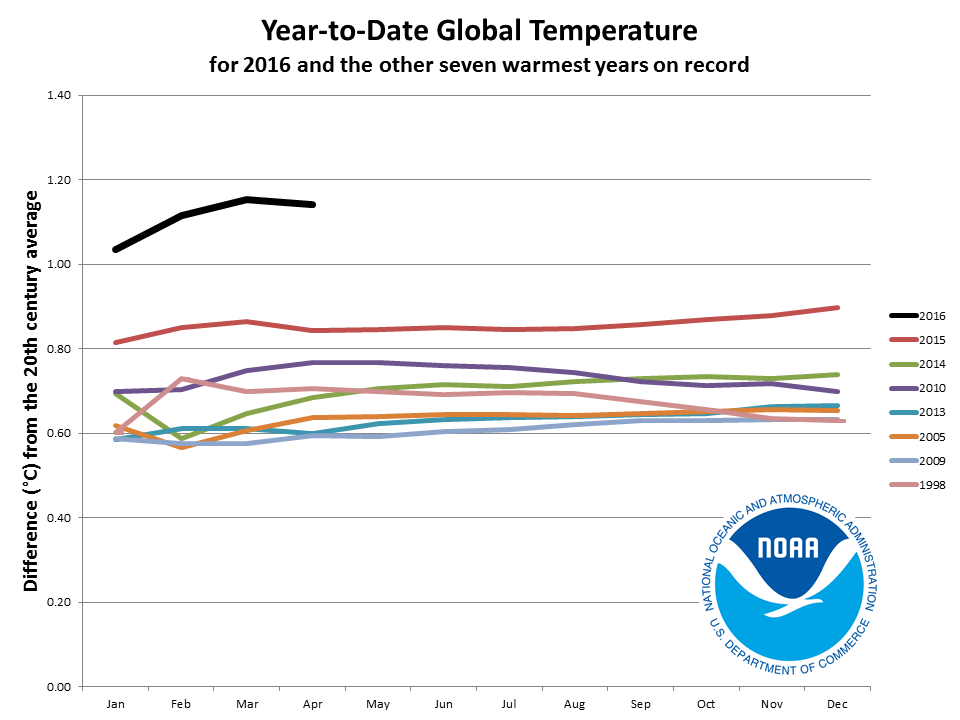- Details
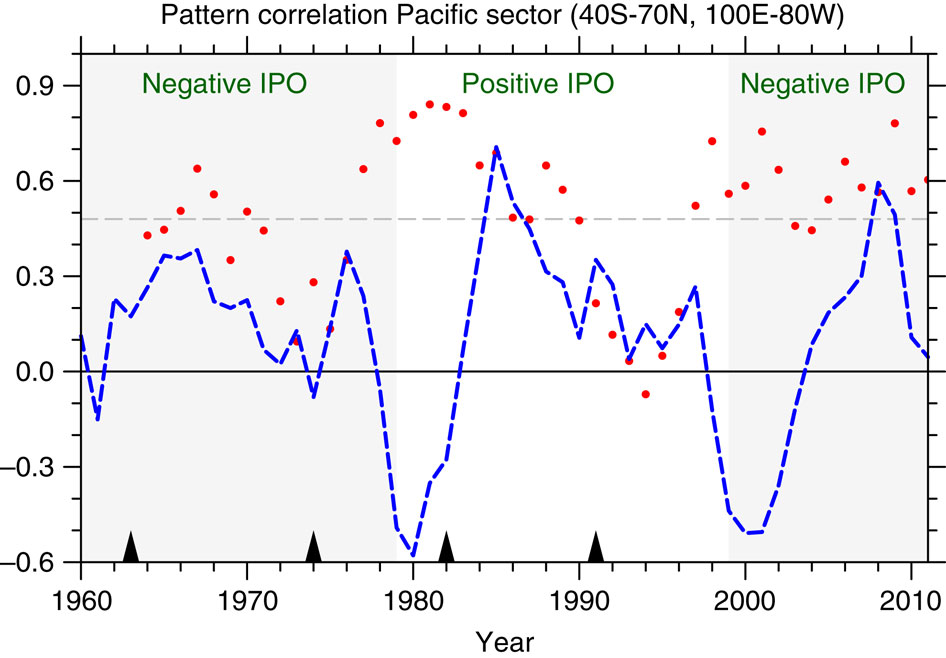 OPEN ACCESS
OPEN ACCESS
Decadal prediction simulations of Niño3.4 sea surface temperatures show a transition from positive to negative phases of the Interdecadal Pacific Oscillation (IPO) and a resumption of larger rates of global warming over the 2013–2022 period consistent with a positive IPO phase. For more see: Meehl, G. A. et al. 2016. Initialized decadal prediction for transition to positive phase of the Interdecadal Pacific Oscillation. Nat. Commun. 7:11718 doi: 10.1038/ncomms11718.
Figure 2: Hindcast skill for the IPO (Meehl et al, 2016).
- Details
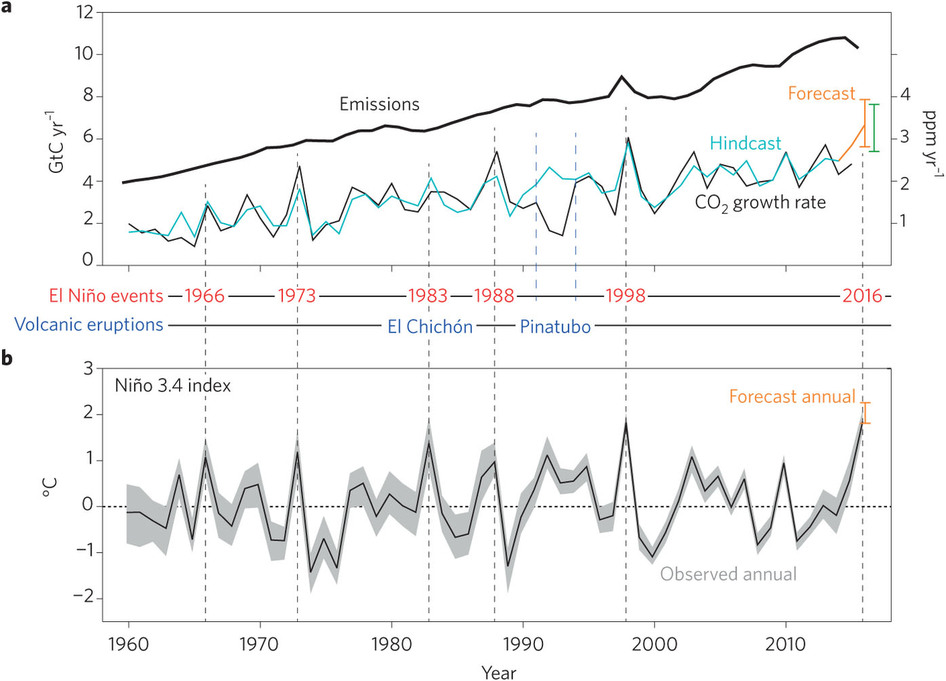 The recent El Niño event has elevated the rise in CO2 concentration this year. Using emissions, sea surface temperature data and a climate model, the authors forecast that the CO2 concentration at Mauna Loa will for the first time remain above 400 ppm all year, and hence for our lifetimes. For more see: Betts, R. A. et al. 2016. El Niño and a record CO2 rise, Nature Climate Change. doi:10.1038/nclimate3063.
The recent El Niño event has elevated the rise in CO2 concentration this year. Using emissions, sea surface temperature data and a climate model, the authors forecast that the CO2 concentration at Mauna Loa will for the first time remain above 400 ppm all year, and hence for our lifetimes. For more see: Betts, R. A. et al. 2016. El Niño and a record CO2 rise, Nature Climate Change. doi:10.1038/nclimate3063.
Figure: Identifying, testing and forecasting the relationship between Niño 3.4 SST anomalies and Mauna Loa CO2 growth rates. Reprinted by permission from Macmillan Publishers Ltd: Nature Climate Change, Betts, R. A. et al. 2016, copyright 2016.
- Details
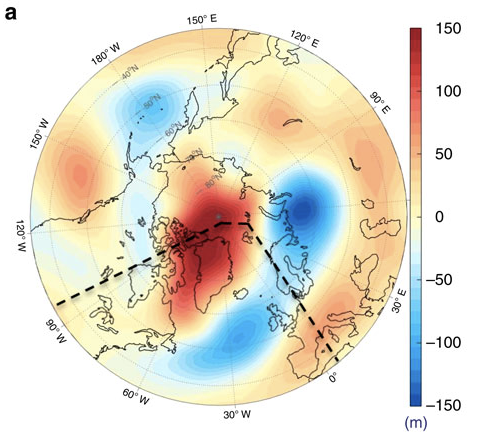 OPEN ACCESS
OPEN ACCESS
Large-scale atmospheric circulation controls the mass and energy balance of the Greenland ice sheet through its impact on radiative budget, runoff and accumulation. For more see: Tedesco, M. et al. 2016. Arctic cut-off high drives the poleward shift of a new Greenland melting record. Nat. Commun. 7:11723 doi: 10.1038/ncomms11723.
(a) 500 hPa geopotential height composite anomaly (m) for the month of July 2015, with respect to the 1981–2010 baseline period (using NCEP–NCARv1 reanalysis) (Tedesco et al., 2016).
- Details
- Workshop on Including Water Management in Large Scale Models
- School on Climate System Prediction and Regional Climate Information
- Reviewers Wanted for NASA Earth Surface and Interior Focus Area
- Call for papers: GEWEX Convection-Permitting Climate Modeling Workshop
- Jobs: Senior Research Scientist and Climate Modelers
For more see GEWEX News.
- Details
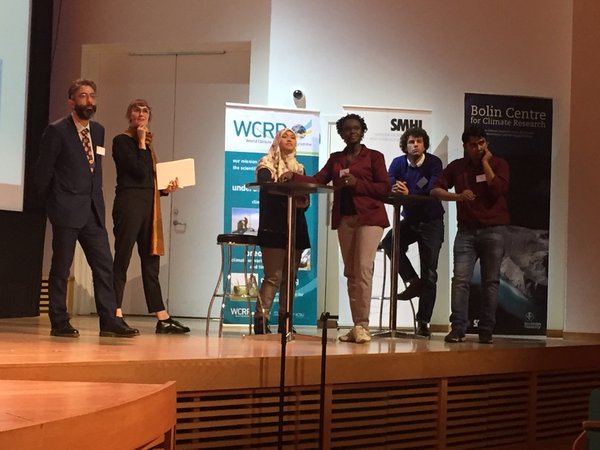 “We are all climate communication heros!”. Read all about the Early Career Scientist Event on communicating climate science that took place at the International Conference for Regional Climate (ICRC): CORDEX 2016 in Stockholm, Sweden.
“We are all climate communication heros!”. Read all about the Early Career Scientist Event on communicating climate science that took place at the International Conference for Regional Climate (ICRC): CORDEX 2016 in Stockholm, Sweden.
- Details
![]() CLIVAR June Bulletin out now! Highlights include:
CLIVAR June Bulletin out now! Highlights include:
- CLIVAR applauds scientists on World Oceans Day
- CLIVAR OSC early bird registration closes 15 June
- Call for new CLIVAR members now open
- CLIVAR present at the Regional Oceanic Numerical Modeling and Observation Workshop
- The US CLIVAR 2015 Summit Report is now available
- ICTP School on Climate System Prediction and Regional Climate Information
- ICAT-Ice Core Analysis Techniques Workshop
- Details
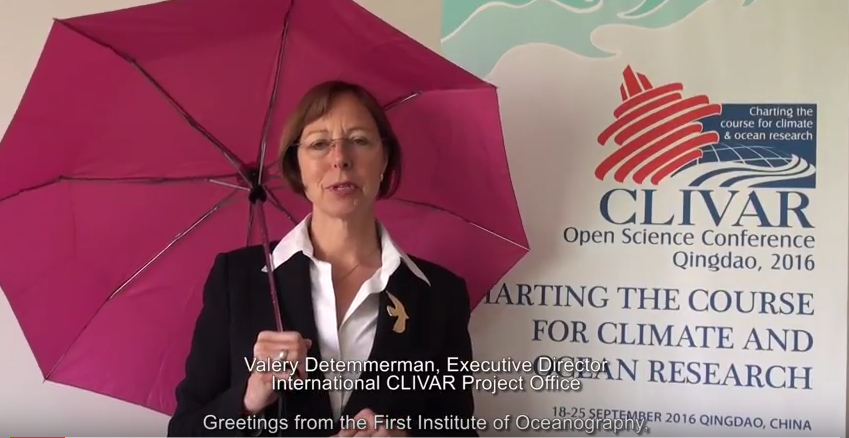 Today is World Oceans Day! Check out this video by Valery Detemmerman, ICPO Executive Director of CLIVAR, which explains why healthy oceans are necessary for a healthy planet.
Today is World Oceans Day! Check out this video by Valery Detemmerman, ICPO Executive Director of CLIVAR, which explains why healthy oceans are necessary for a healthy planet.
- Details
- Details
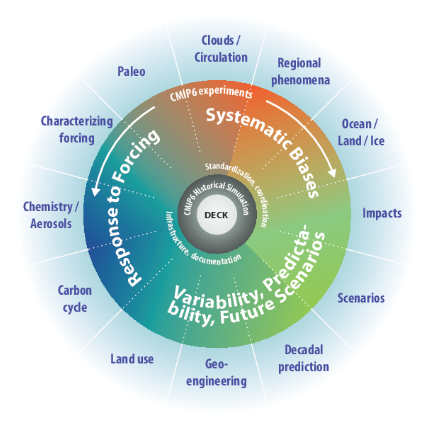 By coordinating the design and distribution of global climate model simulations of the past, current, and future climate, the Coupled Model Intercomparison Project (CMIP) has become one of the foundational elements of climate science. This CMIP6 overview paper presents the background and rationale for the new structure of CMIP, provides a detailed description of the DECK (Diagnostic, Evaluation and Characterization of Klima) and CMIP6 historical simulations, and includes a brief introduction to the 21 CMIP6-Endorsed MIPs.
By coordinating the design and distribution of global climate model simulations of the past, current, and future climate, the Coupled Model Intercomparison Project (CMIP) has become one of the foundational elements of climate science. This CMIP6 overview paper presents the background and rationale for the new structure of CMIP, provides a detailed description of the DECK (Diagnostic, Evaluation and Characterization of Klima) and CMIP6 historical simulations, and includes a brief introduction to the 21 CMIP6-Endorsed MIPs.
- Details
![]() 21-25 November 2016 - Dakar, Senegal
21-25 November 2016 - Dakar, Senegal
This training school will include lectures by leading experts from the World Climate Research Programme (WCRP) Working Group on Seasonal to Interannual Prediction (WGSIP) on predictability over sub-seasonal to decadal timescales, with concrete examples from some of the world’s leading operational centers. Lab-based classes will introduce participants to the new S2S Project subseasonal and CHFP seasonal forecast databases.
For more information see the School Webpage.
- Details
- Details
June, 2016
The climate community does not organize its research nor its modeling activities toward specific temperature targets. We evaluate atmospheric CO2 concentrations that, when incorporated into models with various climate sensitivities, lead to probabilities of global average surface temperatures of a given range at future time periods as one outcome.
- Details
![]() The SPARC Annual Report 2015 is now available online.
The SPARC Annual Report 2015 is now available online.
- Details
![]() Last day to get your applications in for the CLIVAR Executive Director position - deadline 30 May 2016!
Last day to get your applications in for the CLIVAR Executive Director position - deadline 30 May 2016!
For more information see the position outline and application details.
- Details
- Winners of Early Career Researcher Video Competition Announced
- Water for Food Baskets of the World Grand Challenge and Planning for New North American RHP
- Young Earth System Scientist's Activities
- Mapping the 2015 South Carolina Flood Using SMAP and GPM Measurements
- UNESCO-IHP: Addressing Societal Resilience to Climate Change Through International Scientific Cooperation
For more see GEWEX News.
- Details
![]() The call for nominations to the CLIVAR Scientific Steering Group (SSG) and CLIVAR panels is now open. The deadline for nominations for appointments starting in 2017 (and 2018 for the SSG) is 20 July 2016. For more see the call on the CLIVAR website.
The call for nominations to the CLIVAR Scientific Steering Group (SSG) and CLIVAR panels is now open. The deadline for nominations for appointments starting in 2017 (and 2018 for the SSG) is 20 July 2016. For more see the call on the CLIVAR website.
- Details
![]() WCRP CORDEX information feeds directly into policy-driven research. Take, for example, the IMPACT2C web-atlas, which tells visual stories of the potential impacts of climate change with 2°C global warming for key sectors – energy, water, tourism, health, agriculture, ecosystems and forestry, as well as coastal and low-lying areas – at both the pan-European level and for some of the most vulnerable regions of the world to climate change. The conclusions of IMPACT2C have major implications for possible adaptation strategies on national and international scales.
WCRP CORDEX information feeds directly into policy-driven research. Take, for example, the IMPACT2C web-atlas, which tells visual stories of the potential impacts of climate change with 2°C global warming for key sectors – energy, water, tourism, health, agriculture, ecosystems and forestry, as well as coastal and low-lying areas – at both the pan-European level and for some of the most vulnerable regions of the world to climate change. The conclusions of IMPACT2C have major implications for possible adaptation strategies on national and international scales.
Find out more on the regional climate research for climate service: join the CORDEX Conference via web streaming.
- Details

Today marks the start of the International Conference on Regional Climate (ICRC)-CORDEX 2016. Around 350 scientists are gathering in Stockholm from 17 to 20 May to discuss the challenges of downscaling global climate models to generate regional climate data for decision-making. Find the full conference programme on the ICRC-CORDEX Website.
Join the conference by live webstream.
Check out the CORDEX YouTube Channel.
Find out more in the World Meteorological Organization press release: Researchers meet to improve regional climate prediction.
- Details
![]() Registration is now open for audience members to participate in our APECS Online Conference 2016, “Polar Science: Through New Eyes", scheduled for 18 May 2016 (08:50 GMT to 21:20 GMT). It is completely free to attend! This conference will engage scientific dialogues between early career scientists from multiple disciplines and backgrounds on new research perspectives in their field of research.
Registration is now open for audience members to participate in our APECS Online Conference 2016, “Polar Science: Through New Eyes", scheduled for 18 May 2016 (08:50 GMT to 21:20 GMT). It is completely free to attend! This conference will engage scientific dialogues between early career scientists from multiple disciplines and backgrounds on new research perspectives in their field of research.
- Details
![]() CLIVAR Bulletin - News includes that Ms. Jing Li joins the International Clivar Project Office (ICPO) team in Qingdao, China, that CLIVAR seeks a new Executive Director for the ICPO and that there is a call out for US CLIVAR-sponsored workshops.
CLIVAR Bulletin - News includes that Ms. Jing Li joins the International Clivar Project Office (ICPO) team in Qingdao, China, that CLIVAR seeks a new Executive Director for the ICPO and that there is a call out for US CLIVAR-sponsored workshops.
- Details
![]() Find out what is happening at SPARC! This bulletin includes a call for SPARC cover photos, information on special issues of CMIP-6 and CCMI, links to a recent publication by the SPARC Stratospheric Sulfur and its Role in Climate (SSiRC) activity, and an opportunity for early career researchers to join the Young Earth System Scientists (YESS) SPARC group.
Find out what is happening at SPARC! This bulletin includes a call for SPARC cover photos, information on special issues of CMIP-6 and CCMI, links to a recent publication by the SPARC Stratospheric Sulfur and its Role in Climate (SSiRC) activity, and an opportunity for early career researchers to join the Young Earth System Scientists (YESS) SPARC group.
- Details
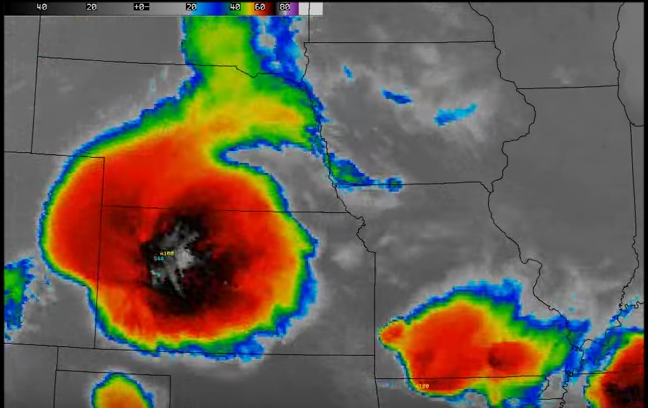 WCRP and the Global Energy and Water Cycle Exchanges (GEWEX) Project are pleased to announce the two winners of the Early Career Researcher (ECR) Video Competition: Theodore Letcher of the University at Albany and Joshua Roundy of the University of Kansas. Both submitted videos addressing the water challenges facing Western North America. Each will receive $500 and be invited to be a member of the Early Career Scientist advisory panel for the new GEWEX North American Regional Hydroclimate Project. Congratulations to the winners!
WCRP and the Global Energy and Water Cycle Exchanges (GEWEX) Project are pleased to announce the two winners of the Early Career Researcher (ECR) Video Competition: Theodore Letcher of the University at Albany and Joshua Roundy of the University of Kansas. Both submitted videos addressing the water challenges facing Western North America. Each will receive $500 and be invited to be a member of the Early Career Scientist advisory panel for the new GEWEX North American Regional Hydroclimate Project. Congratulations to the winners!
- Details
WCRP E-zine was published between 2006 and 2015.
E-zine No. 27, December 2013 Download (pdf, 213 KB)
E-zine No. 26, July 2013 Download (pdf, 221 KB)
E-zine No. 25, March 2013 Download (pdf, 315 KB)
E-zine No. 24, October 2012 Download (pdf, 115 KB)
E-zine No. 23, June 2012 Download (pdf, 102 KB)
E-zine No. 22, February 2012 Download (pdf, 94 KB)
E-zine No. 21, November 2011 Download (pdf, 102 KB)
E-zine No. 20, January 2011 Download (pdf, 100 KB)
E-zine No. 19, September 2010 Download (pdf, 180 KB)
E-zine No. 18, June 2010 Download (pdf, 104 KB)
E-zine No. 17, March 2010 Download (pdf, 106 KB)
E-zine No. 16, December 2009 Download (pdf, 125 KB)
E-zine No. 15, September 2009 Download (pdf, 110 KB)
E-zine No. 14, June 2009 Download (pdf, 124 KB)
E-zine No. 13, March 2009 Download (pdf, 108 KB)
E-zine No. 12, December 2008 Download (pdf, 109 KB)
E-zine No. 11, September 2008 Download (pdf, 107 KB)
E-zine No. 10, June 2008 Download (pdf, 104 KB)
E-zine No. 9, March 2008 Download (pdf, 100 KB)
E-zine No. 8, December 2007 Download (pdf, 100 KB)
E-zine No. 7, September 2007 Download (pdf, 100 KB)
E-zine No. 6, June 2007 Download (pdf, 100 KB)
E-zine No. 5, March 2007 Download (pdf, 104 KB)
E-zine No. 4, December 2006 Download (pdf, 141 KB)
E-zine No. 3, September 2006 Download (pdf, 100 KB)
E-zine No. 2, June 2006 Download (pdf, 60 KB)
E-zine No. 1, March 2006 Download (pdf, 49 KB)
- Details
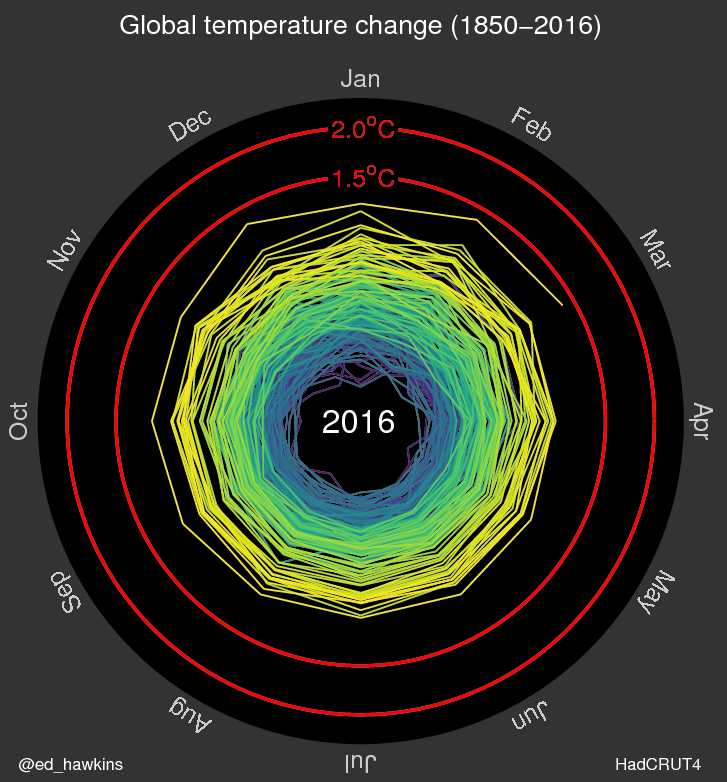 Great animation by Ed Hawkins showing spiralling global temperatures
Great animation by Ed Hawkins showing spiralling global temperatures
The animated spiral presents global temperature change in a visually appealing and straightforward way.
The pace of change is immediately obvious, especially over the past few decades. The relationship between current global temperatures and the internationally discussed target limits are also clear without much complex interpretation needed.
- Details
New data links thunderstorms to climate via their impacts  on aerosols, ozone, and water vapor in the stratosphere.The Deep Convective Clouds and Chemistry (DC3) field campaign was conducted over a broad area of the central US during May-June 2012. Analyses of DC3 data have shown that thunderstorms affect the composition of the upper troposphere and lower stratosphere region by transporting air rich in water vapor, volatile organic compounds, and aerosols from near the Earth’s surface to the UTLS, by producing nitrogen oxides from lightning, and by causing mixing between the troposphere and stratosphere.
on aerosols, ozone, and water vapor in the stratosphere.The Deep Convective Clouds and Chemistry (DC3) field campaign was conducted over a broad area of the central US during May-June 2012. Analyses of DC3 data have shown that thunderstorms affect the composition of the upper troposphere and lower stratosphere region by transporting air rich in water vapor, volatile organic compounds, and aerosols from near the Earth’s surface to the UTLS, by producing nitrogen oxides from lightning, and by causing mixing between the troposphere and stratosphere.
Barth, M and Zhang, C (2016), Connecting thunderstorms and climate through ozone, Eos.
Photo Credit: NASA/Frank Batteas
See the UTLS Observation Workshop, jointly organised by the Global Atmosphere Watch Programme (GAW), Network for the Detection of Atmospheric Composition Change (NDACC) and Stratosphere-troposphere Processes And their Role in Climate (SPARC).




